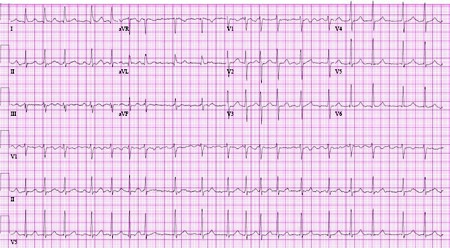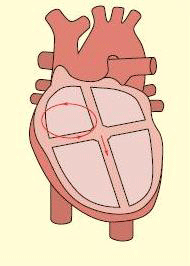Summary
Definition
History and exam
Key diagnostic factors
- presence of risk factors
- worsening heart failure or pulmonary symptoms
Other diagnostic factors
- palpitations
- fatigue or lightheadedness
- jugular venous pulsations with rapid flutter or cannon waves
- chest pain
- dyspnoea
- syncope
- hypotension
- embolic events
- myocardial ischaemia
Risk factors
- increasing age
- valvular dysfunction
- atrial septal defects
- atrial dilation
- recent cardiac or thoracic procedures
- surgical or post-ablation scarring of atria
- heart failure
- hyperthyroidism
- COPD
- asthma
- pneumonia
- anti-arrhythmic drugs for atrial fibrillation
- diabetes
- digitalis use
- male sex
- congenital or lone atrial flutter
Diagnostic investigations
1st investigations to order
- ECG
- full blood count
- thyroid function tests
- renal function and serum electrolytes
- chest x-ray
- transthoracic echocardiography (TTE)
Investigations to consider
- pulmonary function tests
- digitalis level
- high-sensitivity troponin
- CT pulmonary angiography with clinical probability scoring
- electrophysiological studies
- atrial electrogram
- exercise tolerance testing
- myocardial ischaemia testing
Treatment algorithm
Contributors
Expert advisers
Resham Baruah, MBBS, BSc MRCP, PhD
Consultant Cardiologist
Chelsea and Westminster Hospital NHS Foundation Trust
Royal Brompton & Harefield NHS Foundation Trust
London
UK
Biography
RB is specialist advisor to the 2018 NICE guideline on chronic heart failure in adults and is a member of the European Heart Failure Association Task Force on palliative care in heart failure.
Disclosures
RB has received honoraria/speakers’ fees from Novartis and Boehringer Ingelheim.
Acknowledgements
BMJ Best Practice would like to gratefully acknowledge the previous expert contributor, whose work is retained in parts of the content:
Katherine C. Wu, MD, FACC
Associate Professor of Medicine
Johns Hopkins University School of Medicine
Baltimore
MD
Disclosures
KCW declares that she has no competing interests.
Peer reviewers
Gregory Lip, MD, FRCP, DFM, FACC, FESC, FEHRA
Price-Evans Professor of Cardiovascular Medicine
University of Liverpool
Senior Investigator
National Institute for Health Research
UK
Distinguished Professor
Faculty of Medicine
Aalborg University
Denmark
Adjunct Professor
Yonsei University
Seoul
South Korea
Disclosures
GL is a consultant and speaker for BMS/Pfizer, Boehringer Ingelheim, and Daiichi-Sankyo, for which no fees are received personally.
Use of this content is subject to our disclaimer


